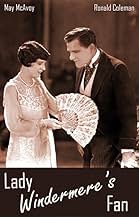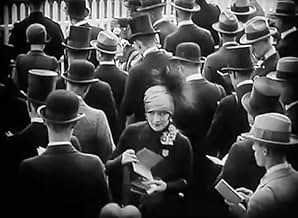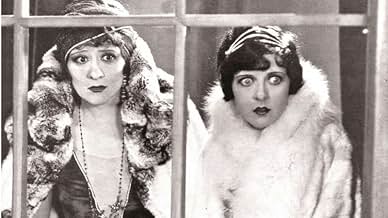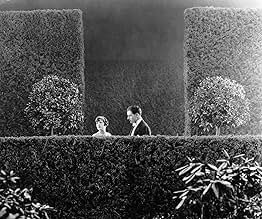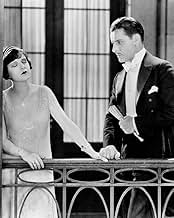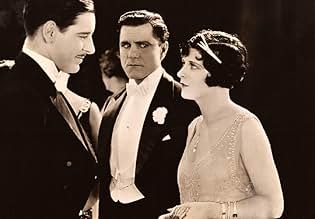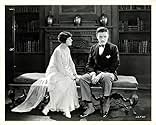IMDb-BEWERTUNG
7,2/10
1438
IHRE BEWERTUNG
Füge eine Handlung in deiner Sprache hinzuA society woman believes her husband is having an affair, a misconception which may have dire personal consequences for all involved.A society woman believes her husband is having an affair, a misconception which may have dire personal consequences for all involved.A society woman believes her husband is having an affair, a misconception which may have dire personal consequences for all involved.
- Auszeichnungen
- 1 wins total
Edward Martindel
- Lord Augustus Lorton
- (as Edw. Martindel)
Carrie Daumery
- The Duchess of Berwick
- (as Mme. Daumery)
Billie Bennett
- Lady Plymdale
- (Nicht genannt)
Michael Dark
- Party Guest
- (Nicht genannt)
Helen Dunbar
- Mrs. Cowper-Cowper
- (Nicht genannt)
Frank Finch Smiles
- Waiter with Party Guest List
- (Nicht genannt)
Larry Steers
- Party Guest
- (Nicht genannt)
Ellinor Vanderveer
- Party Guest
- (Nicht genannt)
Percy Williams
- Waiter at the Party
- (Nicht genannt)
Handlung
WUSSTEST DU SCHON:
- WissenswertesOne of the 50 films in the three-disk boxed DVD set called "More Treasures from American Film Archives, 1894-1931" (2004), compiled by the National Film Preservation Foundation from five American film archives. This film is preserved by the Museum of Modern Art, has a running time of 89 minutes and an added piano music score.
- Zitate
Opening title card: Lady Windermere faced the grave problem of seating her dinner guests.
- VerbindungenFeatured in Historia del cine: Epoca muda (1983)
Ausgewählte Rezension
When a stage play is turned into a movie the results can be dire, especially when the play is a dialog-driven comedy of manners, full of quips and epigrams. Unless it's handled carefully even a great play might come off as 'canned' and lifeless on screen, amounting to little more than what Alfred Hitchcock dismissed as "photographs of people talking." A few exceptions come to mind: The Philadelphia Story, the two versions of Holiday made in the '30s, the Rex Harrison/Margaret Rutherford Blithe Spirit, and a handful of other stage-to-screen adaptations that manage to be lively and entertaining despite heavy reliance on dialog. But these films are surpassed in achievement, in one sense at least, by an adaptation from 1925 which perfectly captures the spirit of the play it presents while scarcely quoting it!
Before seeing Ernst Lubitsch's silent version of Lady Windermere's Fan at the Museum of Modern Art this summer I re-read Oscar Wilde's play, which I enjoyed, but I didn't have high hopes for the movie, despite the involvement of a director I count among my favorites. I imagined the movie would consist of actors standing around in tuxes and evening gowns pretending to mouth witty sayings, which would then be presented to us in numerous title cards; but because I admire Lubitsch's sound films a great deal I thought I'd give it a try. Plus, I thought it'd be interesting to see Ronald Colman in a silent film, deprived of that wonderful voice. What a pleasant surprise to find that this is one of the best sophisticated comedies of the silent screen. The flavor of Wilde's play is distilled to its essence, and clearly conveyed without relying on a single one of his famous epigrams. (Interestingly, a recent biography of Lubitsch says that the film quotes only two or three lines from the play, but if so I didn't catch them.) How is this possible?
Lubitsch conveys Wilde's notions about high society swells and their prejudices cinematically, not verbally. When the notorious Mrs. Erlynne (Irene Rich) appears at the Ascot race track, the reaction of "society" is quickly made clear to us by the scandalized facial expressions of the ladies present; who, nonetheless, can't stop looking at her or talking about her. The tone of their remarks is obvious from their sour expressions. Naturally, the men are interested in Mrs. Erlynne, too. She is shown, montage fashion, from many different angles, through lorgnettes and binoculars, long-shot, extreme long-shot and close-up, and while the horse race is reduced to mere background. It's a funny and informative sequence, yet it isn't in Wilde's play at all. In another scene that more closely follows the text, Lord Darlington (Colman) calls on Lord and Lady Windermere at their home. He is formally announced, and pretends briefly that he actually came to see Lord Windermere on some minor matter. But when Windermere conveniently leaves on business, Darlington, shown in a stately long-shot, strides away from Lady Windermere (May McAvoy), sits, shoots her a sly look, and announces that he is in love with her. Shocked, she crosses and drops into a chair next to him. He rises, crosses away from her, and drops into a different chair. They both look miserable. Fade-out. It's a beautifully staged scene, and no additional dialog is necessary.
Another sequence that occurs late in the film perfectly epitomizes the famous Lubitsch Touch while deftly conveying the spirit of Wilde's play: a title card announces that "The relations between a man and a woman can be told by the way he presses her doorbell." Various ways in which this is so are then demonstrated. You wouldn't think that a close-up shot of a doorbell and a gentleman's gloved hand could be so suggestive, but Lubitsch manages to suggest a great deal.
The black & white cinematography of Lady Windermere's Fan positively shimmers; happily, this is one silent film that has been well preserved. The acting is quite restrained by the standards of the day, and even without his voice Ronald Colman has the presence of a star, while Irene Rich gives the performance of her career. It's a wonderful adaptation of a great play that can stand on its own as cinema; and it may come as a surprise to those who believe silent film comedy begins and ends with Ben Turpin and the Keystone Cops.
Before seeing Ernst Lubitsch's silent version of Lady Windermere's Fan at the Museum of Modern Art this summer I re-read Oscar Wilde's play, which I enjoyed, but I didn't have high hopes for the movie, despite the involvement of a director I count among my favorites. I imagined the movie would consist of actors standing around in tuxes and evening gowns pretending to mouth witty sayings, which would then be presented to us in numerous title cards; but because I admire Lubitsch's sound films a great deal I thought I'd give it a try. Plus, I thought it'd be interesting to see Ronald Colman in a silent film, deprived of that wonderful voice. What a pleasant surprise to find that this is one of the best sophisticated comedies of the silent screen. The flavor of Wilde's play is distilled to its essence, and clearly conveyed without relying on a single one of his famous epigrams. (Interestingly, a recent biography of Lubitsch says that the film quotes only two or three lines from the play, but if so I didn't catch them.) How is this possible?
Lubitsch conveys Wilde's notions about high society swells and their prejudices cinematically, not verbally. When the notorious Mrs. Erlynne (Irene Rich) appears at the Ascot race track, the reaction of "society" is quickly made clear to us by the scandalized facial expressions of the ladies present; who, nonetheless, can't stop looking at her or talking about her. The tone of their remarks is obvious from their sour expressions. Naturally, the men are interested in Mrs. Erlynne, too. She is shown, montage fashion, from many different angles, through lorgnettes and binoculars, long-shot, extreme long-shot and close-up, and while the horse race is reduced to mere background. It's a funny and informative sequence, yet it isn't in Wilde's play at all. In another scene that more closely follows the text, Lord Darlington (Colman) calls on Lord and Lady Windermere at their home. He is formally announced, and pretends briefly that he actually came to see Lord Windermere on some minor matter. But when Windermere conveniently leaves on business, Darlington, shown in a stately long-shot, strides away from Lady Windermere (May McAvoy), sits, shoots her a sly look, and announces that he is in love with her. Shocked, she crosses and drops into a chair next to him. He rises, crosses away from her, and drops into a different chair. They both look miserable. Fade-out. It's a beautifully staged scene, and no additional dialog is necessary.
Another sequence that occurs late in the film perfectly epitomizes the famous Lubitsch Touch while deftly conveying the spirit of Wilde's play: a title card announces that "The relations between a man and a woman can be told by the way he presses her doorbell." Various ways in which this is so are then demonstrated. You wouldn't think that a close-up shot of a doorbell and a gentleman's gloved hand could be so suggestive, but Lubitsch manages to suggest a great deal.
The black & white cinematography of Lady Windermere's Fan positively shimmers; happily, this is one silent film that has been well preserved. The acting is quite restrained by the standards of the day, and even without his voice Ronald Colman has the presence of a star, while Irene Rich gives the performance of her career. It's a wonderful adaptation of a great play that can stand on its own as cinema; and it may come as a surprise to those who believe silent film comedy begins and ends with Ben Turpin and the Keystone Cops.
Top-Auswahl
Melde dich zum Bewerten an und greife auf die Watchlist für personalisierte Empfehlungen zu.
- How long is Lady Windermere's Fan?Powered by Alexa
Details
- Erscheinungsdatum
- Herkunftsland
- Sprache
- Auch bekannt als
- Lady Windermere's Fan
- Drehorte
- Toronto, Ontario, Kanada(Racetrack Scene)
- Produktionsfirma
- Weitere beteiligte Unternehmen bei IMDbPro anzeigen
Box Office
- Budget
- 320.000 $ (geschätzt)
- Laufzeit2 Stunden
- Sound-Mix
- Seitenverhältnis
- 1.33 : 1
Zu dieser Seite beitragen
Bearbeitung vorschlagen oder fehlenden Inhalt hinzufügen

Oberste Lücke
By what name was Lady Windermeres Fächer (1925) officially released in Canada in English?
Antwort
